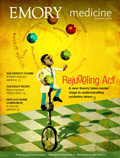A Beautiful Life

Healer, humanist, teacher, scholar: John Stone
Poet-physician John H. Stone III, who found joy in medicine, the arts, family, and people from all walks of life, died of cancer on November 6, 2008. He was 72.
As a cardiologist, teacher, mentor, and writer, Stone focused his entire career on matters of the heart, memorialized in his books of poems and essays in which he explored the link between medicine and literature.
Stone was beloved by many for many reasons—his humor, his listening skills and ability to inspire listening in others, his traditional Veteran’s Day readings of WWI poems, the poem he was asked to write for Emory President James Wagner’s inauguration, and his teaching by example of the healing power of kindness.
He used to say that he wore a ”double harness” of literature and medicine, an easy fit because both are centered on the human story. His own human story was filled with accomplishment, recognition, even celebrity. He was a perennial favorite as a speaker at medical graduation and other events, and his two-man show with Emory music professor William Ransom, “The Poet and the Pianist,” performed at Emory alumni events all over the country, made it all the way to Carnegie Hall in 2001.
Stone joined the faculty in 1969 after completing an Emory fellowship in cardiology. He spent the first half of his career at Grady Memorial Hospital, where he founded and directed the residency program in emergency medicine, now a department. He pulled from his experiences to co-edit Principles and Practices of Emergency Medicine (1978), the first comprehensive textbook in the specialty.
For his last 19 years on the faculty, Stone was associate dean for admissions. He achieved popularity and success as a teacher, receiving the school’s best clinical professor award several times. He also received the Thomas Jefferson Award, the university’s top award for service, leadership, and achievement—one of numerous scholarly honors from various schools.
|
GAUDEAMUS IGITUR |
||
As a writer, Stone is perhaps best known for On Doctoring: Stories, Poems, Essays (1991), an anthology of literature and medicine that he co-edited with Richard Reynolds, former executive vice president of the Robert Wood Johnson Foundation. Every U.S. medical student has received a copy since it was published as a gift from the foundation. “Through his co-editing of On Doctoring, John made tens of thousands of America’s medical students better human beings,” says Emory emergency medicine physician Arthur Kellermann 80M, one of Stone’s former students.
William Eley 83M was a fourth-year medical student when he and two friends trooped to Stone’s office to ask him to teach the first medical humanities course at Emory. Thus, in 1983, Stone created one of the first courses combining literature and medicine. He also taught the course for several years at England’s Oxford University as part of Emory’s Summer Studies Program.
“The literature allowed us to discuss things that we all faced,” says Eley, who now oversees medical education and student affairs. “John turned out to be the ‘heart’ of our medical school. He was where we smiled, cried, rejoiced, and were comforted.”
A writer since 8th grade, Stone began his literary career with The Smell of Matches (1972), which won an award from the Georgia Writers Association. Another book of poems, Renaming the Streets (1985), won the Literature Award from the Mississippi Institute of Arts and Letters. In all, Stone wrote five books of poetry and a book of essays, for which he was inducted into the Georgia Writers Hall of Fame in 2007, the same year as novelist Ferrol Sams 45M. A lover of music, Stone wrote the libretto for Canticles of Time, a choral symphony that won the Music Award of the Mississippi Institute of Arts & Letters in 1991.
The grandson of a general practitioner, Stone was reared in Jackson, Mississippi. Both of his sons became physicians—James 01M at Emory Johns Creek Hospital and John 85C at Massachusetts General Hospital. Their mother, Lu 85G, died in 1991. Stone’s second wife, Mae, worked with him at Emory and after his retirement continued to shape his life so he could write.
Those who knew Stone were accustomed to seeing his front pocket bursting with 3x5 index cards full of notes about any and everything. The cards allowed him to capture what he loved most: listening to others, especially his patients.
“Most patients are ambiguities, living and breathing ones,” said Stone in a convocation address to Emory freshmen in 1981. “The patient is ambiguous because the patient is his own art… Like art, the patient does not tell all that he has to say at the first sitting. The more we look [and listen]…the more there is to see and hear.”—Kay Torrance, Pam Auchmutey, and Sylvia Wobel
In 2005, the Department of Emergency Medicine established the John Stone Fund for Emergency Medicine to honor his talents as a teacher, clinician, and residency program founder. The fund, which Stone also supported through a bequest, will be used to honor and advance gifted educators in the department. Memorial contributions may be sent to Anne Stainback, Emory University, 1440 Clifton Road N.E., Atlanta, GA 30322.


